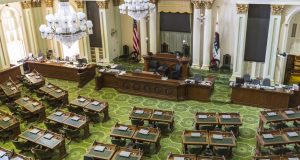By Edward Henderson | California Black Media
The Equal Justice Society (EJS) aims to transform the nation’s consciousness on race through law, social science, and the arts. Their legal strategy aims to broaden conceptions of present-day discrimination to include unconscious and structural bias by using social science, structural analysis, and real-life experience.
Currently, EJS focuses its advocacy efforts on school discipline, special education, the school-to-prison pipeline, race-conscious remedies, and inequities in the criminal justice system.
The Oakland-based nonprofit also engages the arts and artists to create work and performances that allow wider audiences to understand social justice issues and struggles.
California Black Media spoke with Keith Kamisugi, Director of Communications at EJS, on the organization’s successes, disappointments and plans moving forward to the new year.
Looking back at 2024, what stands out to you as your most important achievement and why?
The Equal Justice Society’s most important achievement so far in 2024 is the substantive advancement of reparations in California as one of the leaders of ARRT (the Alliance for Reparations, Reconciliation and Truth) with eight reparations measures passing the state legislature and signed by the Governor and one ballot measure presented to the voters in the general election, (Prop. 6). The cumulative outcome of reparations legislation is a small step for reparations advocates but a giant leap for Black Californians.
On the international front, EJS President Lisa Holder delivered remarks in April 2024 at the United Nations Permanent Forum on People of African Descent in Geneva, Switzerland.
How did your leadership and investments contribute to improving the lives of Black Californians?
In addition to our work with the reparations movement, EJS has directly impacted Black school children and Black women through our lawsuits against several California school districts and against manufacturers of hair relaxers, which caused women to develop uterine and ovarian cancers. In September 2024, EJS’s clients, the Black Parallel School Board (BPSB) and individual families, finalized a five-year plan that improves policies to ensure that students with disabilities, and particularly Black students with disabilities, are no longer subjected to unnecessary exclusion from integrated environments, among other resource and discipline inequities, within Sacramento City Unified School District.
The lawsuit against manufacturers of hair relaxer products led to a June 2024 expose in The New York Times Magazine questioning why hair relaxer products are still being aggressively marketed to Black women when the products have been linked to reproductive disorders and cancers.
What frustrated you the most over the last year?
We have been troubled by the misinformation resulting from some media outlets about reparations developments, such as wrongly equating reparations solely with financial compensation and characterizing stalled reparations legislation as structural defeats for reparations. While financial compensation is part of any comprehensive reparations, it is not the totality of how we repair the harm. Of the 115 recommendations from the California Reparations Task Force Final Report, only one was focused on how to calculate financial compensation. The vast majority of reparations legislation invokes the UN principle of systemic and institutional repair that ensures that the harm of antiblack discrimination ceases and never happens again. Moreover, in terms of characterizing the progress of reparations in California, when we look at 400 years of oppression through White supremacy, one legislative session is not enough time to judge success or failure.
What inspired you the most over the last year?
EJS was inspired by the 630-plus organizations and businesses – majority non-Black – that endorsed the California Reparations Task Force final report or the study of reparations. These endorsements exemplify the broad-based support for the reparations movement from entities that recognize the social imperative to repair the harm caused by 400 years of White supremacy and who seek to support reparations in all its forms — compensation, apology, satisfaction, rehabilitation and guarantees of non-repetition.
What is one lesson you learned in 2024 that will inform your decision-making next year?
Although not a new lesson, something we re-learned in 2024 was the incredible lengths to which the Right Wing will devote resources towards destroying race conscious remedies and truthful narratives that seek to simply level the playing field, afford equal opportunity, provide a factual historical accounting, and repair the harm four centuries of terror and oppression, specifically race-forward harm repair policies such as affirmative action, reparations, critical race theory and DEI. Since 2023, 86 anti-DEI bills have been introduced in 28 states and in Congress. Fourteen of those bills have become law and more than half the states have passed so-called “anti-woke” laws that prohibit narratives that tell the truth about the history of racial oppression in America.
In one word, what is the biggest challenge Black Californians face?
Racism.
What is the goal you want to achieve most in 2025?
We would like to establish reparations and harm repair as the dominant American civil rights issue for the next 25 years. Also, we would like to draw national attention to healthcare inequality and the data points that establish the need for health equity for Black women. Black birthing mothers are 3 times more likely to die during childbirth and from post-partum complications, irrespective of income, due to implicit and explicit bias in healthcare.
 Westside Story Newspaper – Online The News of The Empire – Sharing the Quest for Excellence
Westside Story Newspaper – Online The News of The Empire – Sharing the Quest for Excellence




